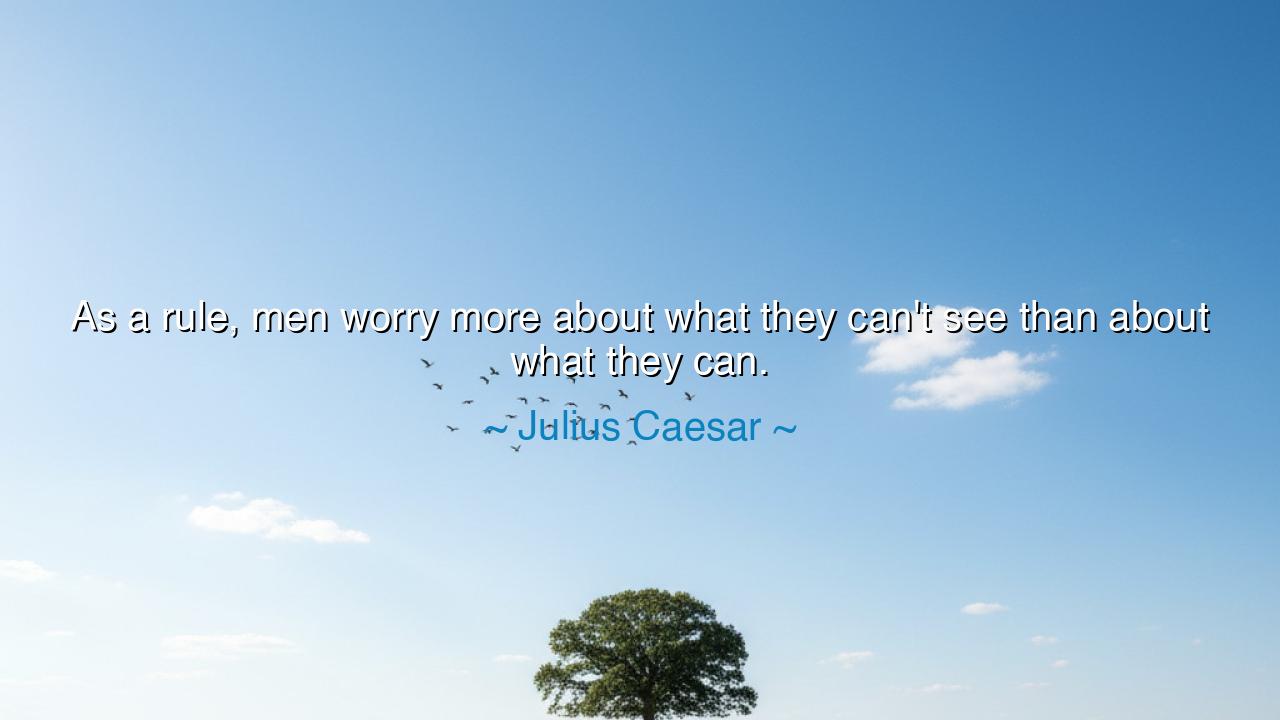
As a rule, men worry more about what they can't see than about






O seekers of wisdom, gather close and listen to the profound words of Julius Caesar, the conqueror of worlds and master of men: "As a rule, men worry more about what they can't see than about what they can." These words speak to the human condition, to the nature of fear, and to the way in which the unknown often holds more power over us than the things that stand clearly before our eyes. Caesar, a man who rose from the ranks of a soldier to the pinnacle of Roman power, understood deeply the forces of uncertainty that shape human action. It is often not the visible dangers, but the invisible, the uncertain, that stir our hearts with the greatest trepidation.
In the ancient world, wisdom was not just about what one could see with the eye, but about understanding the forces that moved behind the scenes. The great philosophers, such as Socrates and Plato, spoke of the unseen world of ideas—the realm of thought and form that shaped the material world. Plato’s Allegory of the Cave teaches us that the shadows on the wall of the cave are not the true reality, but mere reflections of the deeper, unseen truth. Caesar’s words echo this teaching: men often worry about things they cannot perceive, things beyond their control, rather than the tangible realities that lie before them. The unseen, the unknown, fills the mind with fear, for it represents that which we cannot dominate or understand.
Consider the example of Hannibal, the great Carthaginian general, who faced Rome’s seemingly indomitable army with nothing but his wits and an army of soldiers. Hannibal did not fear the visible power of Rome’s legions; instead, he feared what they might do next—the unseen strategy, the unexpected move that could shift the balance of the war. His crossing of the Alps with elephants to invade Italy was not simply a military maneuver; it was an act of confronting the unknown, an attempt to strike fear into the heart of his enemies by exploiting what was unseen—the vastness of the mountains, the hidden paths, the unseen dangers that lay in wait. Caesar, in his own military career, would later face the same challenge: it was not the army before him, but the uncertainty of how the world around him would change, that truly shaped his decisions.
In the modern world, we see the same pattern unfold. The fear of the unknown often paralyzes us more than the challenges right before us. Consider the modern soldier, who faces an enemy in the open field. While the soldier may be trained to face direct combat, it is the fear of what lies beyond the horizon, the ambush waiting in the shadows, that fills the heart with doubt. Similarly, in business, it is often not the market conditions we can clearly see, but the uncertainty of future trends or unseen competitors that causes the most anxiety. We focus on the things that lie hidden and unpredictable, for they hold a power over our minds that the things we can see and touch do not.
The lesson, O children of wisdom, is not to let our worry be governed by the unseen, the uncertain. To live a life of courage and purpose, we must understand that while we cannot control the unknown, we can control our responses to it. Caesar’s wisdom teaches us that much of our suffering comes from the things we fear but cannot see. It is natural to fear the unknown, but it is also a great folly to allow that fear to overshadow the clear path before us. The challenges we face today—the visible ones, the concrete problems—are within our power to confront. It is the invisible worries, the “what ifs” of the future, that often bind us in chains of anxiety.
Consider the wisdom of the Stoics, men like Epictetus and Marcus Aurelius, who faced the uncertainties of life with a calm and steady resolve. They understood that the unknown would always be with us, but that our response to it is what matters. Epictetus famously said, “We cannot choose our external circumstances, but we can always choose how we respond to them.” This is the true meaning of Caesar’s words: that men often worry more about the unseen, the things they cannot control, than about what is right before them, which they have the power to act upon. The Stoic does not fear the shadows, but faces them with the light of reason and courage.
So, O children of wisdom, take heed of this teaching: fear not the unseen, for it is the unseen that often holds the most power over your heart and mind. Recognize that while we cannot control the future, we can control how we engage with the present. Focus not on the shadows that loom ahead, but on the path that lies beneath your feet. The visible challenges, the obstacles you can see and understand, are within your power to face. And in doing so, you will free yourself from the unseen fears that hold you back. The true power lies not in controlling the world, but in mastering your response to it, in acting with clarity and purpose in the face of uncertainty.






AAdministratorAdministrator
Welcome, honored guests. Please leave a comment, we will respond soon